Business Ethics & Sustainability: Uber's Approach
VerifiedAdded on 2022/08/21
|12
|3260
|292
AI Summary
The essay discusses the importance of ethics in business organizations, focusing on Uber Technologies Inc.
The literature review highlights various ethical issues within the company, including privacy invasion, malpractices by drivers, and unethical price surges.
The essay also examines the company's corporate social responsibility activities, using relevant theories such as Stakeholder Theory and Decision Making Model.
Contribute Materials
Your contribution can guide someone’s learning journey. Share your
documents today.
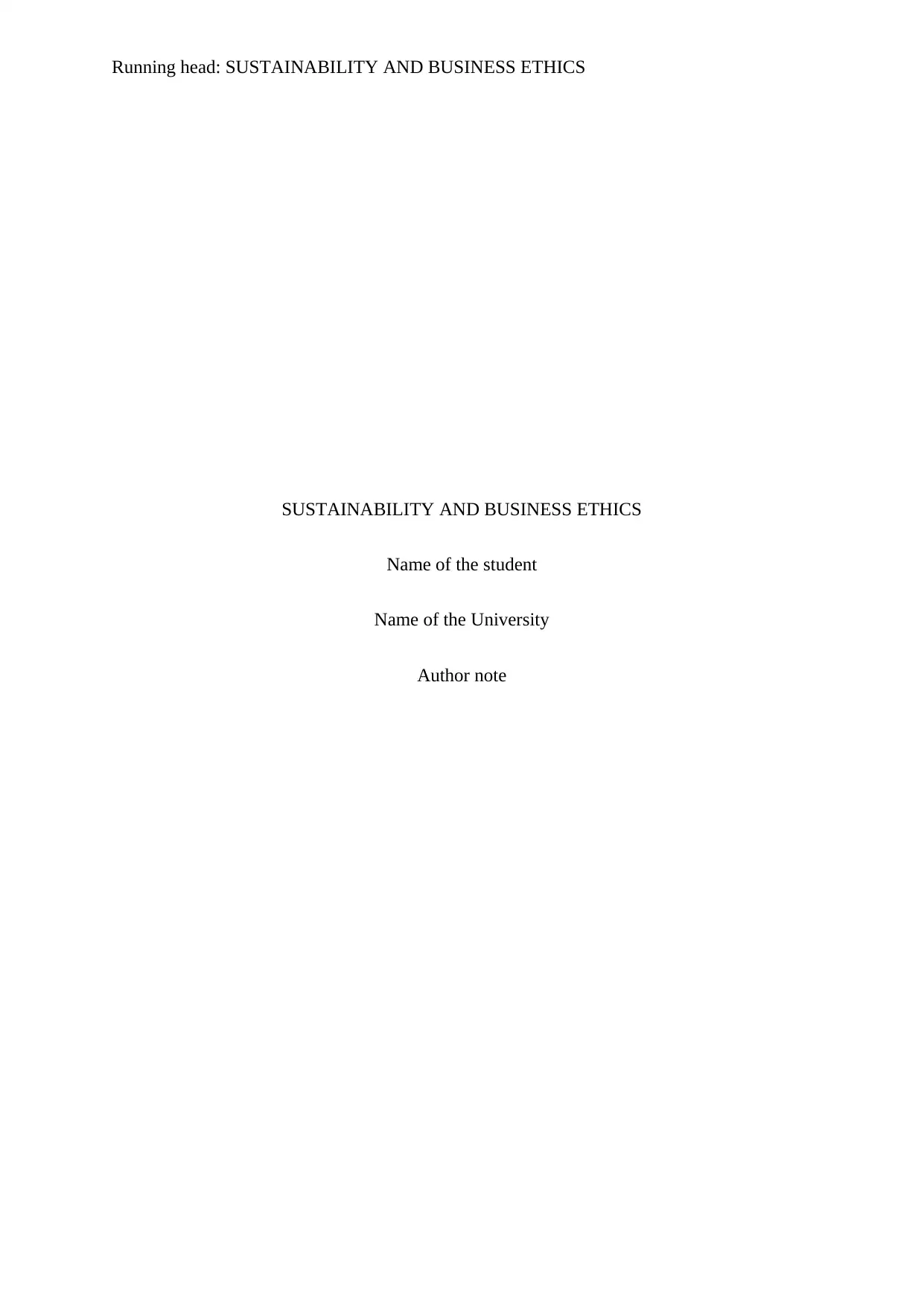
Running head: SUSTAINABILITY AND BUSINESS ETHICS
SUSTAINABILITY AND BUSINESS ETHICS
Name of the student
Name of the University
Author note
SUSTAINABILITY AND BUSINESS ETHICS
Name of the student
Name of the University
Author note
Secure Best Marks with AI Grader
Need help grading? Try our AI Grader for instant feedback on your assignments.
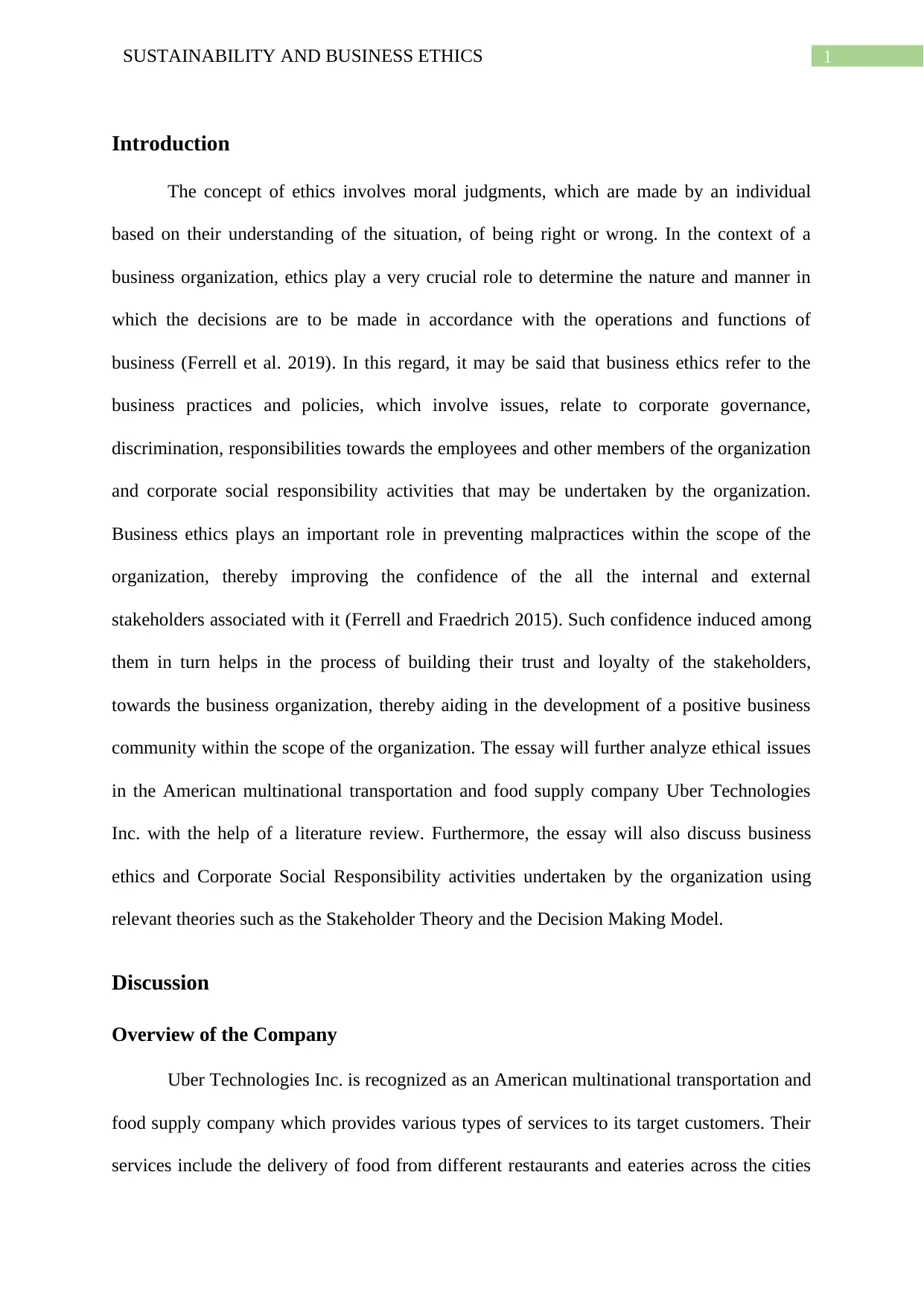
1SUSTAINABILITY AND BUSINESS ETHICS
Introduction
The concept of ethics involves moral judgments, which are made by an individual
based on their understanding of the situation, of being right or wrong. In the context of a
business organization, ethics play a very crucial role to determine the nature and manner in
which the decisions are to be made in accordance with the operations and functions of
business (Ferrell et al. 2019). In this regard, it may be said that business ethics refer to the
business practices and policies, which involve issues, relate to corporate governance,
discrimination, responsibilities towards the employees and other members of the organization
and corporate social responsibility activities that may be undertaken by the organization.
Business ethics plays an important role in preventing malpractices within the scope of the
organization, thereby improving the confidence of the all the internal and external
stakeholders associated with it (Ferrell and Fraedrich 2015). Such confidence induced among
them in turn helps in the process of building their trust and loyalty of the stakeholders,
towards the business organization, thereby aiding in the development of a positive business
community within the scope of the organization. The essay will further analyze ethical issues
in the American multinational transportation and food supply company Uber Technologies
Inc. with the help of a literature review. Furthermore, the essay will also discuss business
ethics and Corporate Social Responsibility activities undertaken by the organization using
relevant theories such as the Stakeholder Theory and the Decision Making Model.
Discussion
Overview of the Company
Uber Technologies Inc. is recognized as an American multinational transportation and
food supply company which provides various types of services to its target customers. Their
services include the delivery of food from different restaurants and eateries across the cities
Introduction
The concept of ethics involves moral judgments, which are made by an individual
based on their understanding of the situation, of being right or wrong. In the context of a
business organization, ethics play a very crucial role to determine the nature and manner in
which the decisions are to be made in accordance with the operations and functions of
business (Ferrell et al. 2019). In this regard, it may be said that business ethics refer to the
business practices and policies, which involve issues, relate to corporate governance,
discrimination, responsibilities towards the employees and other members of the organization
and corporate social responsibility activities that may be undertaken by the organization.
Business ethics plays an important role in preventing malpractices within the scope of the
organization, thereby improving the confidence of the all the internal and external
stakeholders associated with it (Ferrell and Fraedrich 2015). Such confidence induced among
them in turn helps in the process of building their trust and loyalty of the stakeholders,
towards the business organization, thereby aiding in the development of a positive business
community within the scope of the organization. The essay will further analyze ethical issues
in the American multinational transportation and food supply company Uber Technologies
Inc. with the help of a literature review. Furthermore, the essay will also discuss business
ethics and Corporate Social Responsibility activities undertaken by the organization using
relevant theories such as the Stakeholder Theory and the Decision Making Model.
Discussion
Overview of the Company
Uber Technologies Inc. is recognized as an American multinational transportation and
food supply company which provides various types of services to its target customers. Their
services include the delivery of food from different restaurants and eateries across the cities
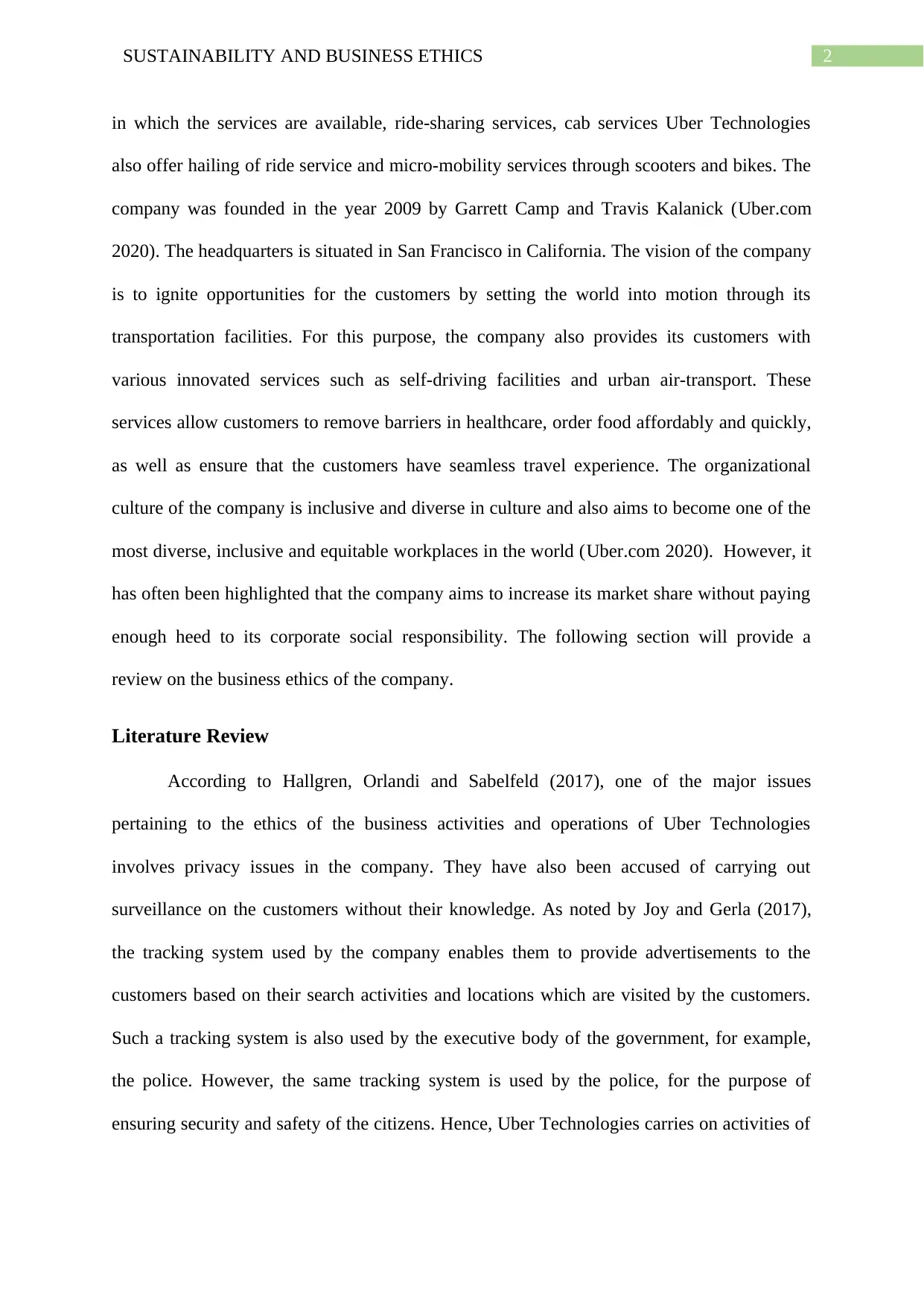
2SUSTAINABILITY AND BUSINESS ETHICS
in which the services are available, ride-sharing services, cab services Uber Technologies
also offer hailing of ride service and micro-mobility services through scooters and bikes. The
company was founded in the year 2009 by Garrett Camp and Travis Kalanick (Uber.com
2020). The headquarters is situated in San Francisco in California. The vision of the company
is to ignite opportunities for the customers by setting the world into motion through its
transportation facilities. For this purpose, the company also provides its customers with
various innovated services such as self-driving facilities and urban air-transport. These
services allow customers to remove barriers in healthcare, order food affordably and quickly,
as well as ensure that the customers have seamless travel experience. The organizational
culture of the company is inclusive and diverse in culture and also aims to become one of the
most diverse, inclusive and equitable workplaces in the world (Uber.com 2020). However, it
has often been highlighted that the company aims to increase its market share without paying
enough heed to its corporate social responsibility. The following section will provide a
review on the business ethics of the company.
Literature Review
According to Hallgren, Orlandi and Sabelfeld (2017), one of the major issues
pertaining to the ethics of the business activities and operations of Uber Technologies
involves privacy issues in the company. They have also been accused of carrying out
surveillance on the customers without their knowledge. As noted by Joy and Gerla (2017),
the tracking system used by the company enables them to provide advertisements to the
customers based on their search activities and locations which are visited by the customers.
Such a tracking system is also used by the executive body of the government, for example,
the police. However, the same tracking system is used by the police, for the purpose of
ensuring security and safety of the citizens. Hence, Uber Technologies carries on activities of
in which the services are available, ride-sharing services, cab services Uber Technologies
also offer hailing of ride service and micro-mobility services through scooters and bikes. The
company was founded in the year 2009 by Garrett Camp and Travis Kalanick (Uber.com
2020). The headquarters is situated in San Francisco in California. The vision of the company
is to ignite opportunities for the customers by setting the world into motion through its
transportation facilities. For this purpose, the company also provides its customers with
various innovated services such as self-driving facilities and urban air-transport. These
services allow customers to remove barriers in healthcare, order food affordably and quickly,
as well as ensure that the customers have seamless travel experience. The organizational
culture of the company is inclusive and diverse in culture and also aims to become one of the
most diverse, inclusive and equitable workplaces in the world (Uber.com 2020). However, it
has often been highlighted that the company aims to increase its market share without paying
enough heed to its corporate social responsibility. The following section will provide a
review on the business ethics of the company.
Literature Review
According to Hallgren, Orlandi and Sabelfeld (2017), one of the major issues
pertaining to the ethics of the business activities and operations of Uber Technologies
involves privacy issues in the company. They have also been accused of carrying out
surveillance on the customers without their knowledge. As noted by Joy and Gerla (2017),
the tracking system used by the company enables them to provide advertisements to the
customers based on their search activities and locations which are visited by the customers.
Such a tracking system is also used by the executive body of the government, for example,
the police. However, the same tracking system is used by the police, for the purpose of
ensuring security and safety of the citizens. Hence, Uber Technologies carries on activities of
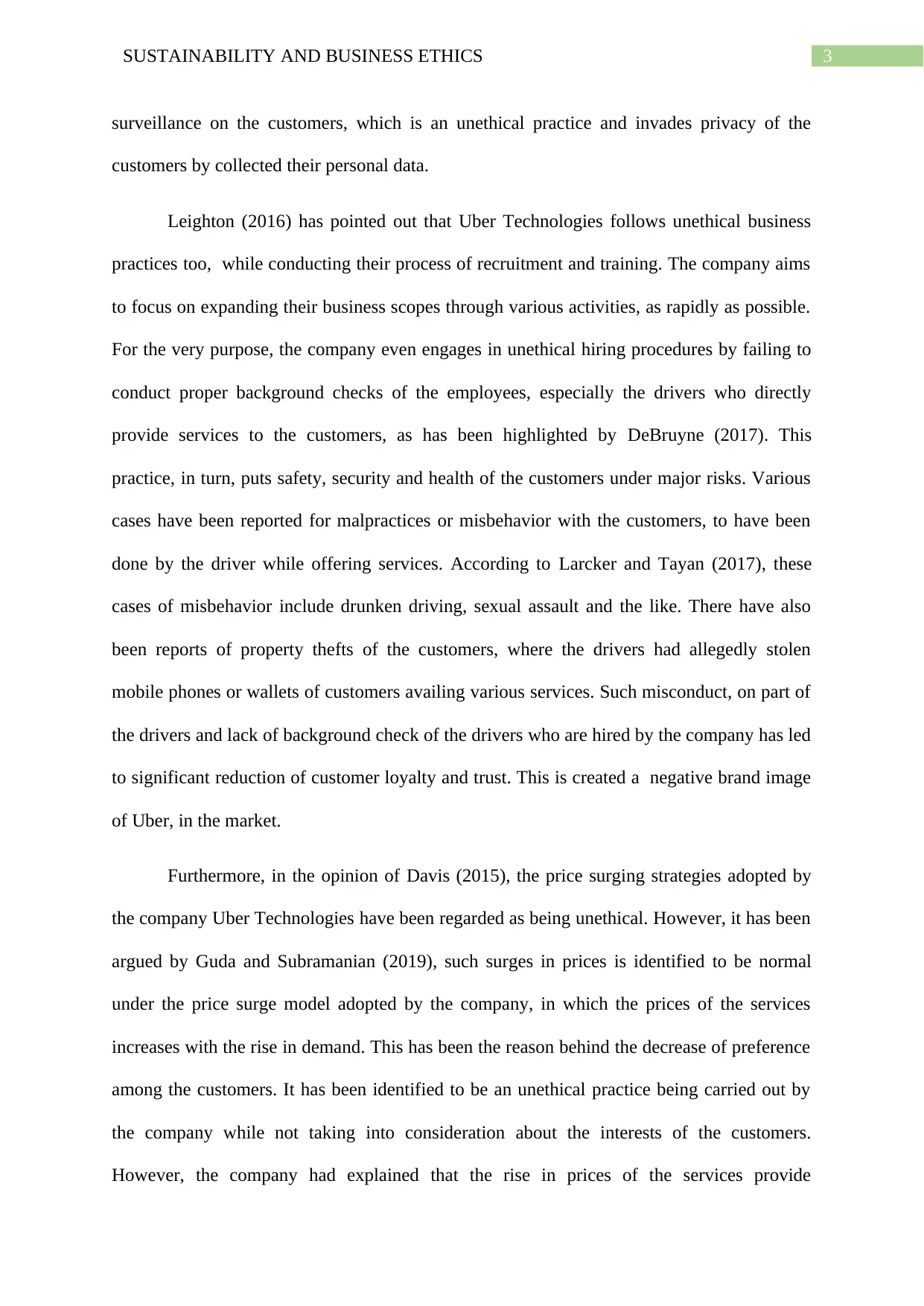
3SUSTAINABILITY AND BUSINESS ETHICS
surveillance on the customers, which is an unethical practice and invades privacy of the
customers by collected their personal data.
Leighton (2016) has pointed out that Uber Technologies follows unethical business
practices too, while conducting their process of recruitment and training. The company aims
to focus on expanding their business scopes through various activities, as rapidly as possible.
For the very purpose, the company even engages in unethical hiring procedures by failing to
conduct proper background checks of the employees, especially the drivers who directly
provide services to the customers, as has been highlighted by DeBruyne (2017). This
practice, in turn, puts safety, security and health of the customers under major risks. Various
cases have been reported for malpractices or misbehavior with the customers, to have been
done by the driver while offering services. According to Larcker and Tayan (2017), these
cases of misbehavior include drunken driving, sexual assault and the like. There have also
been reports of property thefts of the customers, where the drivers had allegedly stolen
mobile phones or wallets of customers availing various services. Such misconduct, on part of
the drivers and lack of background check of the drivers who are hired by the company has led
to significant reduction of customer loyalty and trust. This is created a negative brand image
of Uber, in the market.
Furthermore, in the opinion of Davis (2015), the price surging strategies adopted by
the company Uber Technologies have been regarded as being unethical. However, it has been
argued by Guda and Subramanian (2019), such surges in prices is identified to be normal
under the price surge model adopted by the company, in which the prices of the services
increases with the rise in demand. This has been the reason behind the decrease of preference
among the customers. It has been identified to be an unethical practice being carried out by
the company while not taking into consideration about the interests of the customers.
However, the company had explained that the rise in prices of the services provide
surveillance on the customers, which is an unethical practice and invades privacy of the
customers by collected their personal data.
Leighton (2016) has pointed out that Uber Technologies follows unethical business
practices too, while conducting their process of recruitment and training. The company aims
to focus on expanding their business scopes through various activities, as rapidly as possible.
For the very purpose, the company even engages in unethical hiring procedures by failing to
conduct proper background checks of the employees, especially the drivers who directly
provide services to the customers, as has been highlighted by DeBruyne (2017). This
practice, in turn, puts safety, security and health of the customers under major risks. Various
cases have been reported for malpractices or misbehavior with the customers, to have been
done by the driver while offering services. According to Larcker and Tayan (2017), these
cases of misbehavior include drunken driving, sexual assault and the like. There have also
been reports of property thefts of the customers, where the drivers had allegedly stolen
mobile phones or wallets of customers availing various services. Such misconduct, on part of
the drivers and lack of background check of the drivers who are hired by the company has led
to significant reduction of customer loyalty and trust. This is created a negative brand image
of Uber, in the market.
Furthermore, in the opinion of Davis (2015), the price surging strategies adopted by
the company Uber Technologies have been regarded as being unethical. However, it has been
argued by Guda and Subramanian (2019), such surges in prices is identified to be normal
under the price surge model adopted by the company, in which the prices of the services
increases with the rise in demand. This has been the reason behind the decrease of preference
among the customers. It has been identified to be an unethical practice being carried out by
the company while not taking into consideration about the interests of the customers.
However, the company had explained that the rise in prices of the services provide
Secure Best Marks with AI Grader
Need help grading? Try our AI Grader for instant feedback on your assignments.
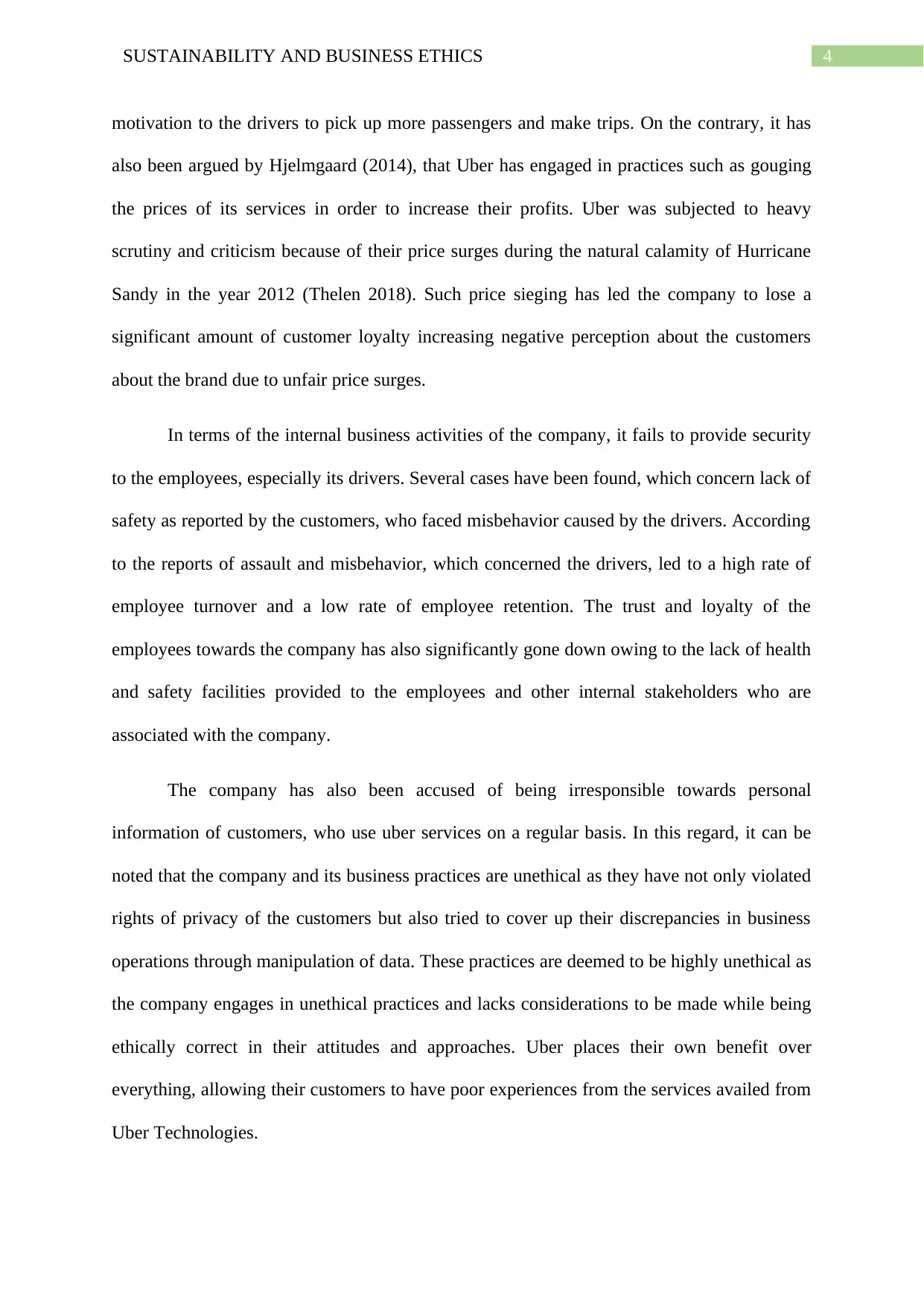
4SUSTAINABILITY AND BUSINESS ETHICS
motivation to the drivers to pick up more passengers and make trips. On the contrary, it has
also been argued by Hjelmgaard (2014), that Uber has engaged in practices such as gouging
the prices of its services in order to increase their profits. Uber was subjected to heavy
scrutiny and criticism because of their price surges during the natural calamity of Hurricane
Sandy in the year 2012 (Thelen 2018). Such price sieging has led the company to lose a
significant amount of customer loyalty increasing negative perception about the customers
about the brand due to unfair price surges.
In terms of the internal business activities of the company, it fails to provide security
to the employees, especially its drivers. Several cases have been found, which concern lack of
safety as reported by the customers, who faced misbehavior caused by the drivers. According
to the reports of assault and misbehavior, which concerned the drivers, led to a high rate of
employee turnover and a low rate of employee retention. The trust and loyalty of the
employees towards the company has also significantly gone down owing to the lack of health
and safety facilities provided to the employees and other internal stakeholders who are
associated with the company.
The company has also been accused of being irresponsible towards personal
information of customers, who use uber services on a regular basis. In this regard, it can be
noted that the company and its business practices are unethical as they have not only violated
rights of privacy of the customers but also tried to cover up their discrepancies in business
operations through manipulation of data. These practices are deemed to be highly unethical as
the company engages in unethical practices and lacks considerations to be made while being
ethically correct in their attitudes and approaches. Uber places their own benefit over
everything, allowing their customers to have poor experiences from the services availed from
Uber Technologies.
motivation to the drivers to pick up more passengers and make trips. On the contrary, it has
also been argued by Hjelmgaard (2014), that Uber has engaged in practices such as gouging
the prices of its services in order to increase their profits. Uber was subjected to heavy
scrutiny and criticism because of their price surges during the natural calamity of Hurricane
Sandy in the year 2012 (Thelen 2018). Such price sieging has led the company to lose a
significant amount of customer loyalty increasing negative perception about the customers
about the brand due to unfair price surges.
In terms of the internal business activities of the company, it fails to provide security
to the employees, especially its drivers. Several cases have been found, which concern lack of
safety as reported by the customers, who faced misbehavior caused by the drivers. According
to the reports of assault and misbehavior, which concerned the drivers, led to a high rate of
employee turnover and a low rate of employee retention. The trust and loyalty of the
employees towards the company has also significantly gone down owing to the lack of health
and safety facilities provided to the employees and other internal stakeholders who are
associated with the company.
The company has also been accused of being irresponsible towards personal
information of customers, who use uber services on a regular basis. In this regard, it can be
noted that the company and its business practices are unethical as they have not only violated
rights of privacy of the customers but also tried to cover up their discrepancies in business
operations through manipulation of data. These practices are deemed to be highly unethical as
the company engages in unethical practices and lacks considerations to be made while being
ethically correct in their attitudes and approaches. Uber places their own benefit over
everything, allowing their customers to have poor experiences from the services availed from
Uber Technologies.
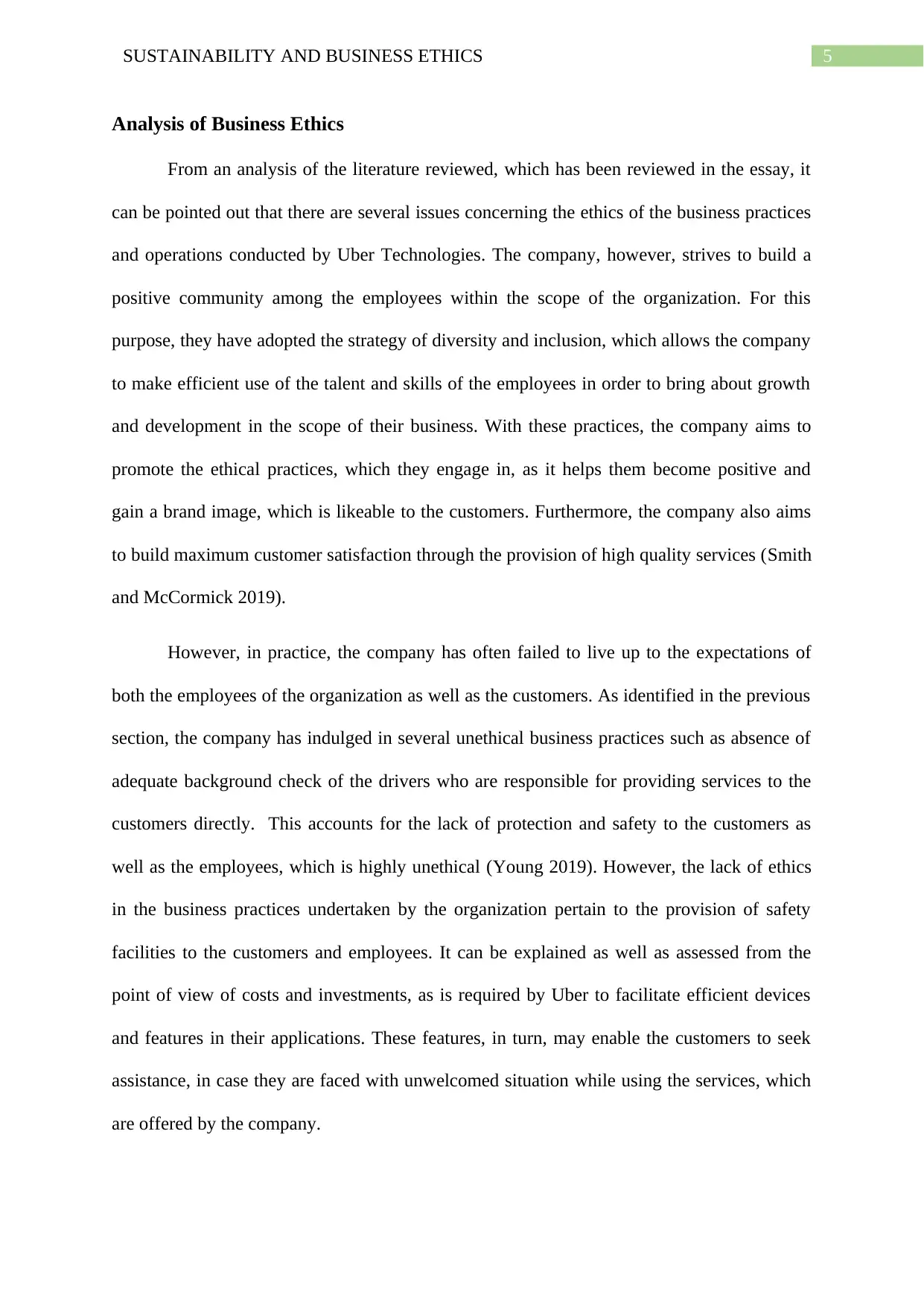
5SUSTAINABILITY AND BUSINESS ETHICS
Analysis of Business Ethics
From an analysis of the literature reviewed, which has been reviewed in the essay, it
can be pointed out that there are several issues concerning the ethics of the business practices
and operations conducted by Uber Technologies. The company, however, strives to build a
positive community among the employees within the scope of the organization. For this
purpose, they have adopted the strategy of diversity and inclusion, which allows the company
to make efficient use of the talent and skills of the employees in order to bring about growth
and development in the scope of their business. With these practices, the company aims to
promote the ethical practices, which they engage in, as it helps them become positive and
gain a brand image, which is likeable to the customers. Furthermore, the company also aims
to build maximum customer satisfaction through the provision of high quality services (Smith
and McCormick 2019).
However, in practice, the company has often failed to live up to the expectations of
both the employees of the organization as well as the customers. As identified in the previous
section, the company has indulged in several unethical business practices such as absence of
adequate background check of the drivers who are responsible for providing services to the
customers directly. This accounts for the lack of protection and safety to the customers as
well as the employees, which is highly unethical (Young 2019). However, the lack of ethics
in the business practices undertaken by the organization pertain to the provision of safety
facilities to the customers and employees. It can be explained as well as assessed from the
point of view of costs and investments, as is required by Uber to facilitate efficient devices
and features in their applications. These features, in turn, may enable the customers to seek
assistance, in case they are faced with unwelcomed situation while using the services, which
are offered by the company.
Analysis of Business Ethics
From an analysis of the literature reviewed, which has been reviewed in the essay, it
can be pointed out that there are several issues concerning the ethics of the business practices
and operations conducted by Uber Technologies. The company, however, strives to build a
positive community among the employees within the scope of the organization. For this
purpose, they have adopted the strategy of diversity and inclusion, which allows the company
to make efficient use of the talent and skills of the employees in order to bring about growth
and development in the scope of their business. With these practices, the company aims to
promote the ethical practices, which they engage in, as it helps them become positive and
gain a brand image, which is likeable to the customers. Furthermore, the company also aims
to build maximum customer satisfaction through the provision of high quality services (Smith
and McCormick 2019).
However, in practice, the company has often failed to live up to the expectations of
both the employees of the organization as well as the customers. As identified in the previous
section, the company has indulged in several unethical business practices such as absence of
adequate background check of the drivers who are responsible for providing services to the
customers directly. This accounts for the lack of protection and safety to the customers as
well as the employees, which is highly unethical (Young 2019). However, the lack of ethics
in the business practices undertaken by the organization pertain to the provision of safety
facilities to the customers and employees. It can be explained as well as assessed from the
point of view of costs and investments, as is required by Uber to facilitate efficient devices
and features in their applications. These features, in turn, may enable the customers to seek
assistance, in case they are faced with unwelcomed situation while using the services, which
are offered by the company.
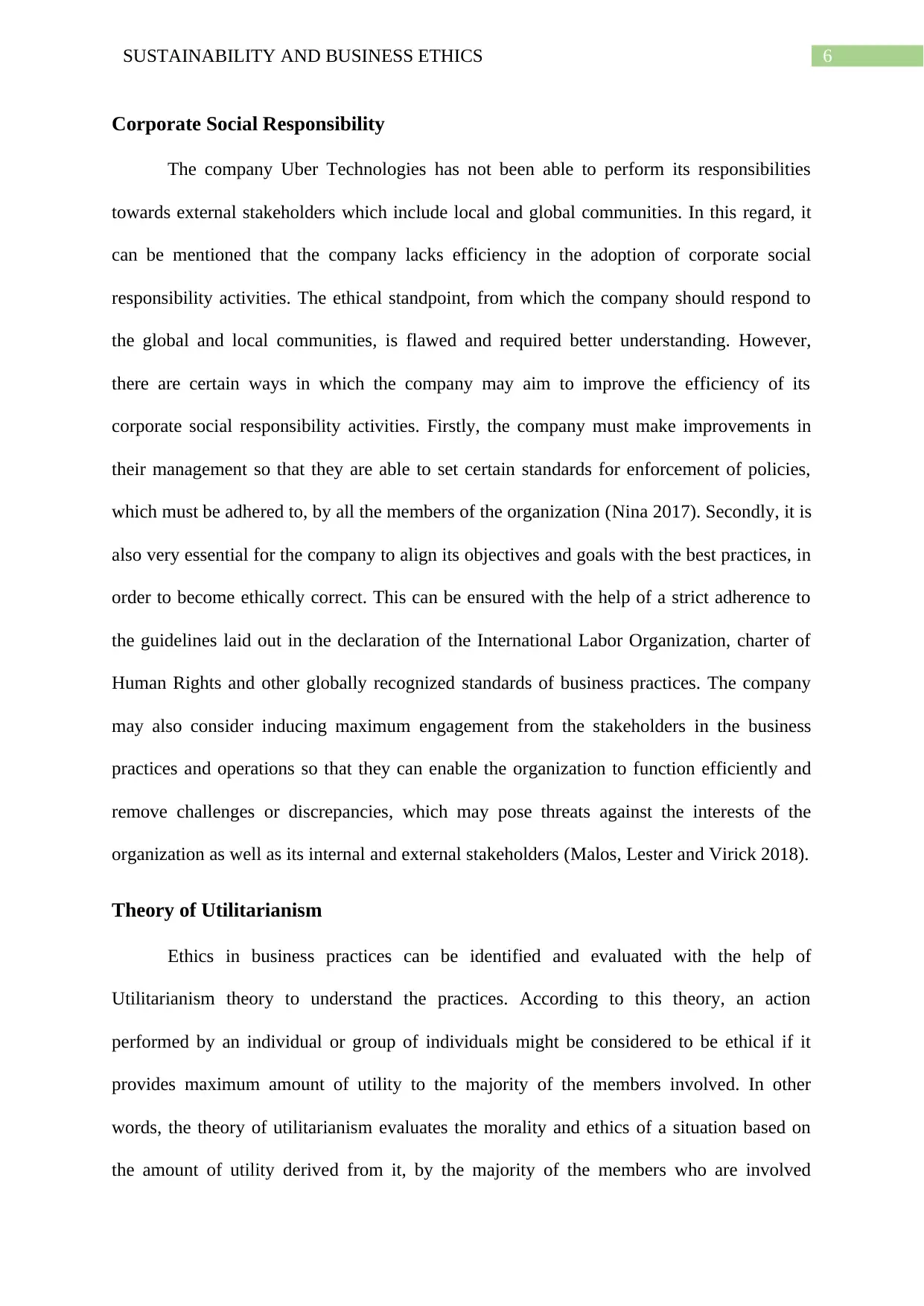
6SUSTAINABILITY AND BUSINESS ETHICS
Corporate Social Responsibility
The company Uber Technologies has not been able to perform its responsibilities
towards external stakeholders which include local and global communities. In this regard, it
can be mentioned that the company lacks efficiency in the adoption of corporate social
responsibility activities. The ethical standpoint, from which the company should respond to
the global and local communities, is flawed and required better understanding. However,
there are certain ways in which the company may aim to improve the efficiency of its
corporate social responsibility activities. Firstly, the company must make improvements in
their management so that they are able to set certain standards for enforcement of policies,
which must be adhered to, by all the members of the organization (Nina 2017). Secondly, it is
also very essential for the company to align its objectives and goals with the best practices, in
order to become ethically correct. This can be ensured with the help of a strict adherence to
the guidelines laid out in the declaration of the International Labor Organization, charter of
Human Rights and other globally recognized standards of business practices. The company
may also consider inducing maximum engagement from the stakeholders in the business
practices and operations so that they can enable the organization to function efficiently and
remove challenges or discrepancies, which may pose threats against the interests of the
organization as well as its internal and external stakeholders (Malos, Lester and Virick 2018).
Theory of Utilitarianism
Ethics in business practices can be identified and evaluated with the help of
Utilitarianism theory to understand the practices. According to this theory, an action
performed by an individual or group of individuals might be considered to be ethical if it
provides maximum amount of utility to the majority of the members involved. In other
words, the theory of utilitarianism evaluates the morality and ethics of a situation based on
the amount of utility derived from it, by the majority of the members who are involved
Corporate Social Responsibility
The company Uber Technologies has not been able to perform its responsibilities
towards external stakeholders which include local and global communities. In this regard, it
can be mentioned that the company lacks efficiency in the adoption of corporate social
responsibility activities. The ethical standpoint, from which the company should respond to
the global and local communities, is flawed and required better understanding. However,
there are certain ways in which the company may aim to improve the efficiency of its
corporate social responsibility activities. Firstly, the company must make improvements in
their management so that they are able to set certain standards for enforcement of policies,
which must be adhered to, by all the members of the organization (Nina 2017). Secondly, it is
also very essential for the company to align its objectives and goals with the best practices, in
order to become ethically correct. This can be ensured with the help of a strict adherence to
the guidelines laid out in the declaration of the International Labor Organization, charter of
Human Rights and other globally recognized standards of business practices. The company
may also consider inducing maximum engagement from the stakeholders in the business
practices and operations so that they can enable the organization to function efficiently and
remove challenges or discrepancies, which may pose threats against the interests of the
organization as well as its internal and external stakeholders (Malos, Lester and Virick 2018).
Theory of Utilitarianism
Ethics in business practices can be identified and evaluated with the help of
Utilitarianism theory to understand the practices. According to this theory, an action
performed by an individual or group of individuals might be considered to be ethical if it
provides maximum amount of utility to the majority of the members involved. In other
words, the theory of utilitarianism evaluates the morality and ethics of a situation based on
the amount of utility derived from it, by the majority of the members who are involved
Paraphrase This Document
Need a fresh take? Get an instant paraphrase of this document with our AI Paraphraser
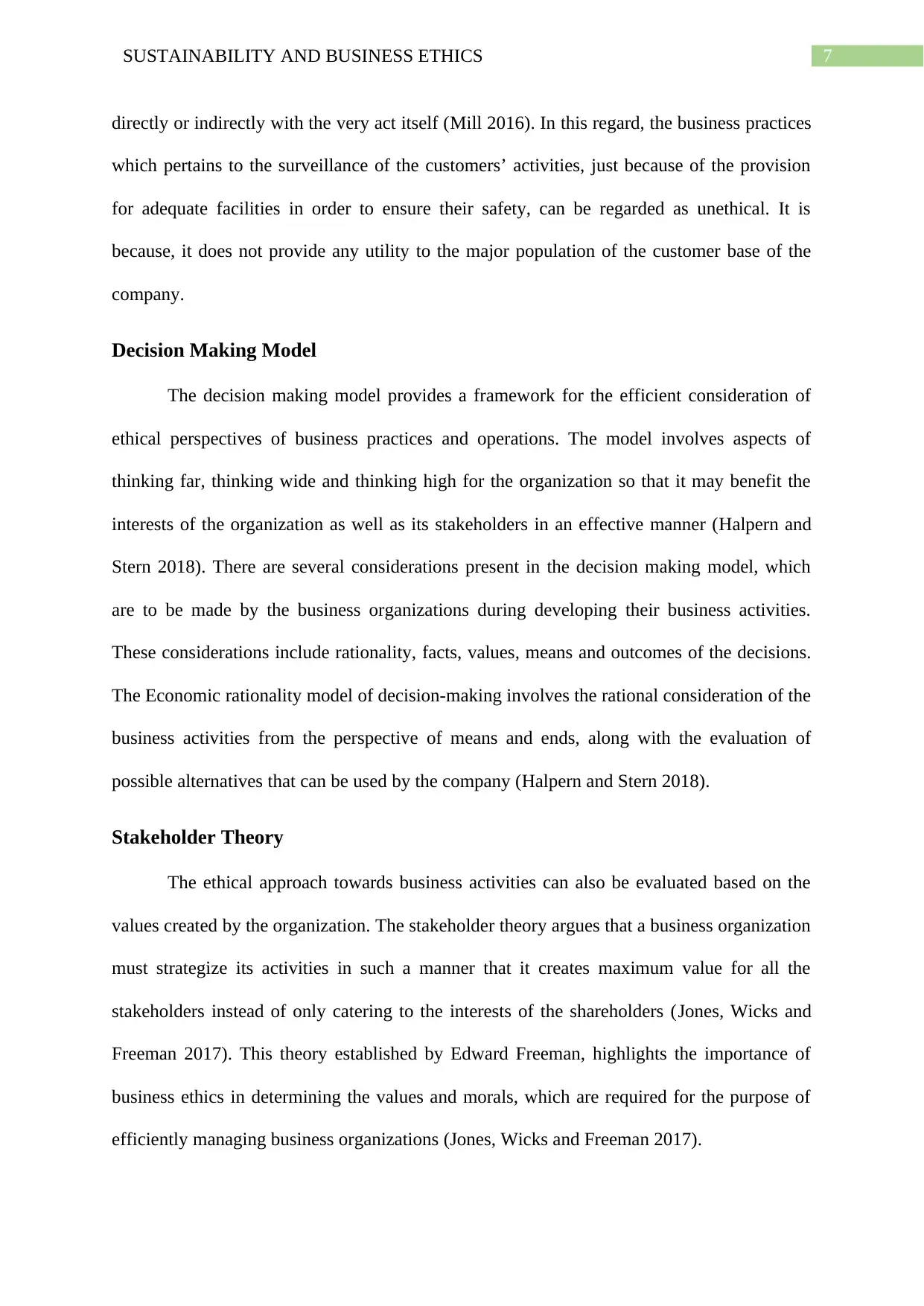
7SUSTAINABILITY AND BUSINESS ETHICS
directly or indirectly with the very act itself (Mill 2016). In this regard, the business practices
which pertains to the surveillance of the customers’ activities, just because of the provision
for adequate facilities in order to ensure their safety, can be regarded as unethical. It is
because, it does not provide any utility to the major population of the customer base of the
company.
Decision Making Model
The decision making model provides a framework for the efficient consideration of
ethical perspectives of business practices and operations. The model involves aspects of
thinking far, thinking wide and thinking high for the organization so that it may benefit the
interests of the organization as well as its stakeholders in an effective manner (Halpern and
Stern 2018). There are several considerations present in the decision making model, which
are to be made by the business organizations during developing their business activities.
These considerations include rationality, facts, values, means and outcomes of the decisions.
The Economic rationality model of decision-making involves the rational consideration of the
business activities from the perspective of means and ends, along with the evaluation of
possible alternatives that can be used by the company (Halpern and Stern 2018).
Stakeholder Theory
The ethical approach towards business activities can also be evaluated based on the
values created by the organization. The stakeholder theory argues that a business organization
must strategize its activities in such a manner that it creates maximum value for all the
stakeholders instead of only catering to the interests of the shareholders (Jones, Wicks and
Freeman 2017). This theory established by Edward Freeman, highlights the importance of
business ethics in determining the values and morals, which are required for the purpose of
efficiently managing business organizations (Jones, Wicks and Freeman 2017).
directly or indirectly with the very act itself (Mill 2016). In this regard, the business practices
which pertains to the surveillance of the customers’ activities, just because of the provision
for adequate facilities in order to ensure their safety, can be regarded as unethical. It is
because, it does not provide any utility to the major population of the customer base of the
company.
Decision Making Model
The decision making model provides a framework for the efficient consideration of
ethical perspectives of business practices and operations. The model involves aspects of
thinking far, thinking wide and thinking high for the organization so that it may benefit the
interests of the organization as well as its stakeholders in an effective manner (Halpern and
Stern 2018). There are several considerations present in the decision making model, which
are to be made by the business organizations during developing their business activities.
These considerations include rationality, facts, values, means and outcomes of the decisions.
The Economic rationality model of decision-making involves the rational consideration of the
business activities from the perspective of means and ends, along with the evaluation of
possible alternatives that can be used by the company (Halpern and Stern 2018).
Stakeholder Theory
The ethical approach towards business activities can also be evaluated based on the
values created by the organization. The stakeholder theory argues that a business organization
must strategize its activities in such a manner that it creates maximum value for all the
stakeholders instead of only catering to the interests of the shareholders (Jones, Wicks and
Freeman 2017). This theory established by Edward Freeman, highlights the importance of
business ethics in determining the values and morals, which are required for the purpose of
efficiently managing business organizations (Jones, Wicks and Freeman 2017).
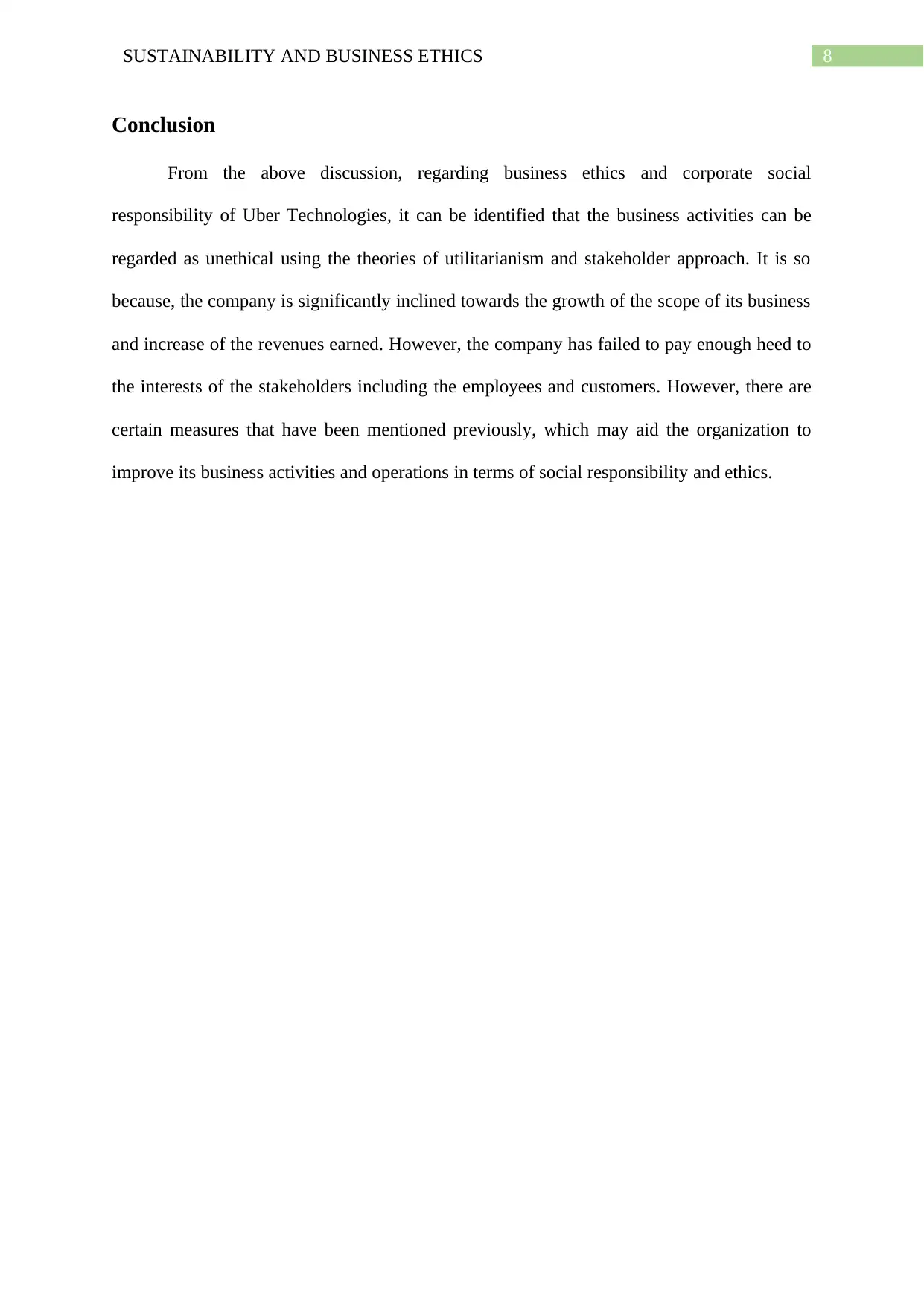
8SUSTAINABILITY AND BUSINESS ETHICS
Conclusion
From the above discussion, regarding business ethics and corporate social
responsibility of Uber Technologies, it can be identified that the business activities can be
regarded as unethical using the theories of utilitarianism and stakeholder approach. It is so
because, the company is significantly inclined towards the growth of the scope of its business
and increase of the revenues earned. However, the company has failed to pay enough heed to
the interests of the stakeholders including the employees and customers. However, there are
certain measures that have been mentioned previously, which may aid the organization to
improve its business activities and operations in terms of social responsibility and ethics.
Conclusion
From the above discussion, regarding business ethics and corporate social
responsibility of Uber Technologies, it can be identified that the business activities can be
regarded as unethical using the theories of utilitarianism and stakeholder approach. It is so
because, the company is significantly inclined towards the growth of the scope of its business
and increase of the revenues earned. However, the company has failed to pay enough heed to
the interests of the stakeholders including the employees and customers. However, there are
certain measures that have been mentioned previously, which may aid the organization to
improve its business activities and operations in terms of social responsibility and ethics.
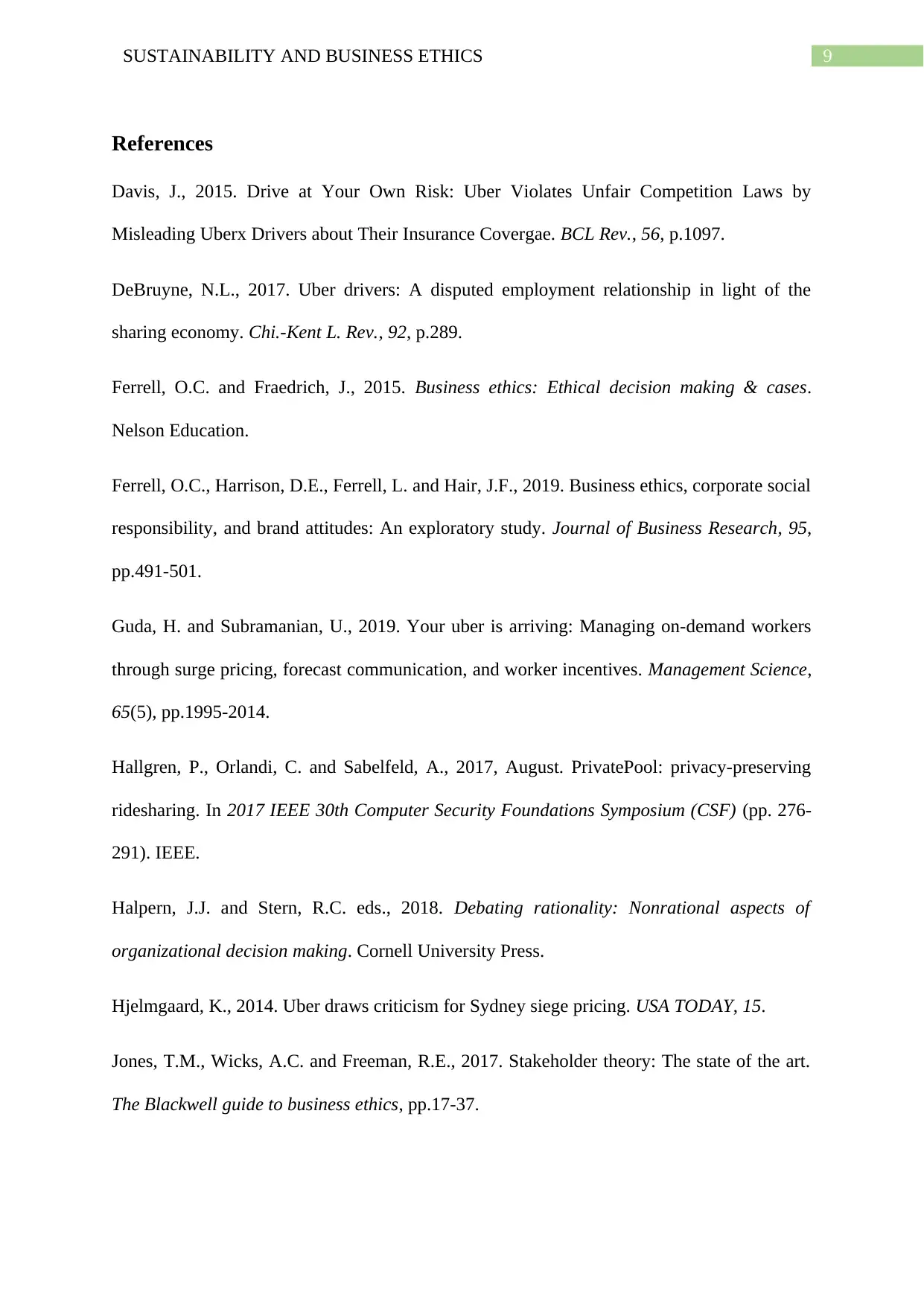
9SUSTAINABILITY AND BUSINESS ETHICS
References
Davis, J., 2015. Drive at Your Own Risk: Uber Violates Unfair Competition Laws by
Misleading Uberx Drivers about Their Insurance Covergae. BCL Rev., 56, p.1097.
DeBruyne, N.L., 2017. Uber drivers: A disputed employment relationship in light of the
sharing economy. Chi.-Kent L. Rev., 92, p.289.
Ferrell, O.C. and Fraedrich, J., 2015. Business ethics: Ethical decision making & cases.
Nelson Education.
Ferrell, O.C., Harrison, D.E., Ferrell, L. and Hair, J.F., 2019. Business ethics, corporate social
responsibility, and brand attitudes: An exploratory study. Journal of Business Research, 95,
pp.491-501.
Guda, H. and Subramanian, U., 2019. Your uber is arriving: Managing on-demand workers
through surge pricing, forecast communication, and worker incentives. Management Science,
65(5), pp.1995-2014.
Hallgren, P., Orlandi, C. and Sabelfeld, A., 2017, August. PrivatePool: privacy-preserving
ridesharing. In 2017 IEEE 30th Computer Security Foundations Symposium (CSF) (pp. 276-
291). IEEE.
Halpern, J.J. and Stern, R.C. eds., 2018. Debating rationality: Nonrational aspects of
organizational decision making. Cornell University Press.
Hjelmgaard, K., 2014. Uber draws criticism for Sydney siege pricing. USA TODAY, 15.
Jones, T.M., Wicks, A.C. and Freeman, R.E., 2017. Stakeholder theory: The state of the art.
The Blackwell guide to business ethics, pp.17-37.
References
Davis, J., 2015. Drive at Your Own Risk: Uber Violates Unfair Competition Laws by
Misleading Uberx Drivers about Their Insurance Covergae. BCL Rev., 56, p.1097.
DeBruyne, N.L., 2017. Uber drivers: A disputed employment relationship in light of the
sharing economy. Chi.-Kent L. Rev., 92, p.289.
Ferrell, O.C. and Fraedrich, J., 2015. Business ethics: Ethical decision making & cases.
Nelson Education.
Ferrell, O.C., Harrison, D.E., Ferrell, L. and Hair, J.F., 2019. Business ethics, corporate social
responsibility, and brand attitudes: An exploratory study. Journal of Business Research, 95,
pp.491-501.
Guda, H. and Subramanian, U., 2019. Your uber is arriving: Managing on-demand workers
through surge pricing, forecast communication, and worker incentives. Management Science,
65(5), pp.1995-2014.
Hallgren, P., Orlandi, C. and Sabelfeld, A., 2017, August. PrivatePool: privacy-preserving
ridesharing. In 2017 IEEE 30th Computer Security Foundations Symposium (CSF) (pp. 276-
291). IEEE.
Halpern, J.J. and Stern, R.C. eds., 2018. Debating rationality: Nonrational aspects of
organizational decision making. Cornell University Press.
Hjelmgaard, K., 2014. Uber draws criticism for Sydney siege pricing. USA TODAY, 15.
Jones, T.M., Wicks, A.C. and Freeman, R.E., 2017. Stakeholder theory: The state of the art.
The Blackwell guide to business ethics, pp.17-37.
Secure Best Marks with AI Grader
Need help grading? Try our AI Grader for instant feedback on your assignments.
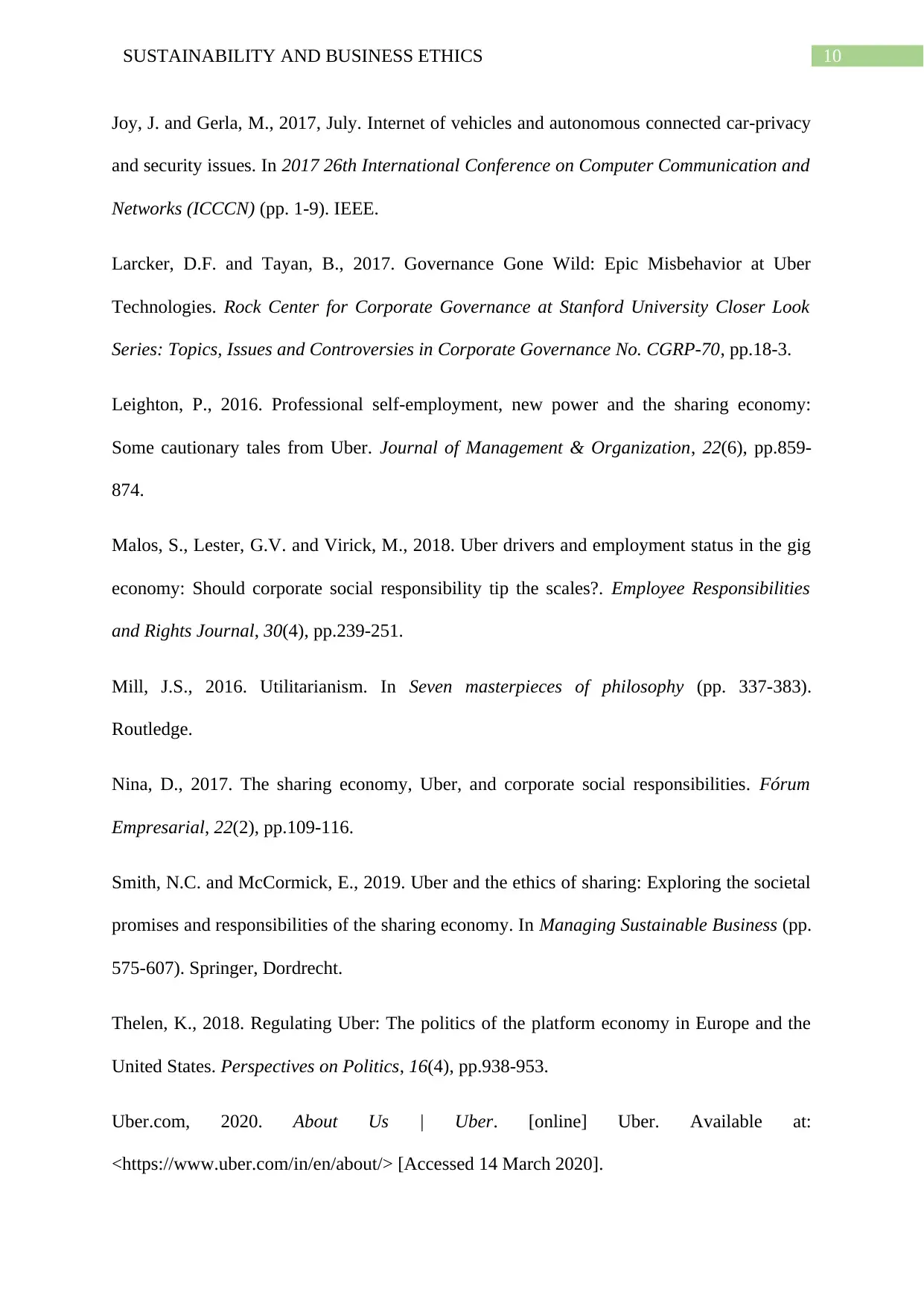
10SUSTAINABILITY AND BUSINESS ETHICS
Joy, J. and Gerla, M., 2017, July. Internet of vehicles and autonomous connected car-privacy
and security issues. In 2017 26th International Conference on Computer Communication and
Networks (ICCCN) (pp. 1-9). IEEE.
Larcker, D.F. and Tayan, B., 2017. Governance Gone Wild: Epic Misbehavior at Uber
Technologies. Rock Center for Corporate Governance at Stanford University Closer Look
Series: Topics, Issues and Controversies in Corporate Governance No. CGRP-70, pp.18-3.
Leighton, P., 2016. Professional self-employment, new power and the sharing economy:
Some cautionary tales from Uber. Journal of Management & Organization, 22(6), pp.859-
874.
Malos, S., Lester, G.V. and Virick, M., 2018. Uber drivers and employment status in the gig
economy: Should corporate social responsibility tip the scales?. Employee Responsibilities
and Rights Journal, 30(4), pp.239-251.
Mill, J.S., 2016. Utilitarianism. In Seven masterpieces of philosophy (pp. 337-383).
Routledge.
Nina, D., 2017. The sharing economy, Uber, and corporate social responsibilities. Fórum
Empresarial, 22(2), pp.109-116.
Smith, N.C. and McCormick, E., 2019. Uber and the ethics of sharing: Exploring the societal
promises and responsibilities of the sharing economy. In Managing Sustainable Business (pp.
575-607). Springer, Dordrecht.
Thelen, K., 2018. Regulating Uber: The politics of the platform economy in Europe and the
United States. Perspectives on Politics, 16(4), pp.938-953.
Uber.com, 2020. About Us | Uber. [online] Uber. Available at:
<https://www.uber.com/in/en/about/> [Accessed 14 March 2020].
Joy, J. and Gerla, M., 2017, July. Internet of vehicles and autonomous connected car-privacy
and security issues. In 2017 26th International Conference on Computer Communication and
Networks (ICCCN) (pp. 1-9). IEEE.
Larcker, D.F. and Tayan, B., 2017. Governance Gone Wild: Epic Misbehavior at Uber
Technologies. Rock Center for Corporate Governance at Stanford University Closer Look
Series: Topics, Issues and Controversies in Corporate Governance No. CGRP-70, pp.18-3.
Leighton, P., 2016. Professional self-employment, new power and the sharing economy:
Some cautionary tales from Uber. Journal of Management & Organization, 22(6), pp.859-
874.
Malos, S., Lester, G.V. and Virick, M., 2018. Uber drivers and employment status in the gig
economy: Should corporate social responsibility tip the scales?. Employee Responsibilities
and Rights Journal, 30(4), pp.239-251.
Mill, J.S., 2016. Utilitarianism. In Seven masterpieces of philosophy (pp. 337-383).
Routledge.
Nina, D., 2017. The sharing economy, Uber, and corporate social responsibilities. Fórum
Empresarial, 22(2), pp.109-116.
Smith, N.C. and McCormick, E., 2019. Uber and the ethics of sharing: Exploring the societal
promises and responsibilities of the sharing economy. In Managing Sustainable Business (pp.
575-607). Springer, Dordrecht.
Thelen, K., 2018. Regulating Uber: The politics of the platform economy in Europe and the
United States. Perspectives on Politics, 16(4), pp.938-953.
Uber.com, 2020. About Us | Uber. [online] Uber. Available at:
<https://www.uber.com/in/en/about/> [Accessed 14 March 2020].
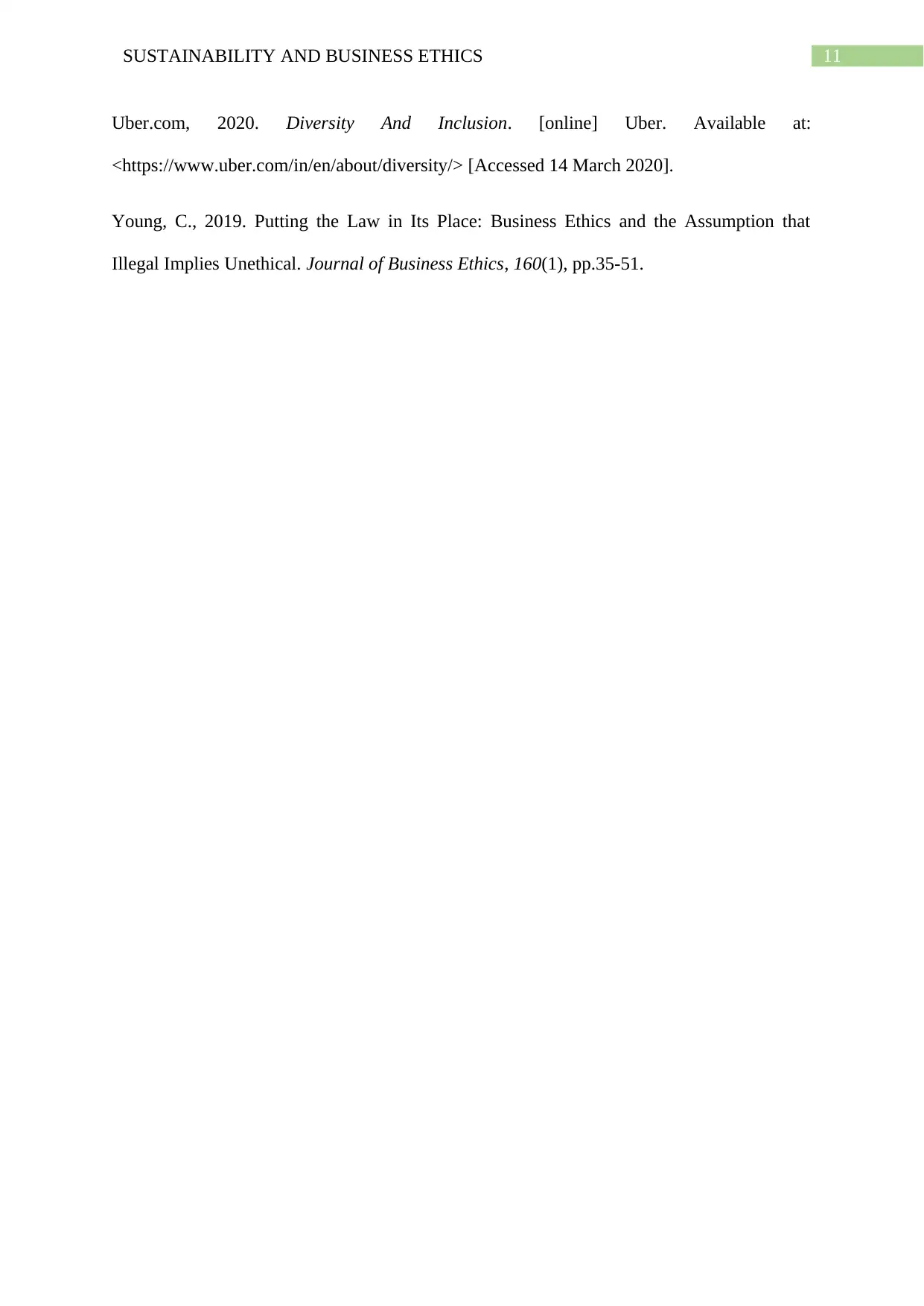
11SUSTAINABILITY AND BUSINESS ETHICS
Uber.com, 2020. Diversity And Inclusion. [online] Uber. Available at:
<https://www.uber.com/in/en/about/diversity/> [Accessed 14 March 2020].
Young, C., 2019. Putting the Law in Its Place: Business Ethics and the Assumption that
Illegal Implies Unethical. Journal of Business Ethics, 160(1), pp.35-51.
Uber.com, 2020. Diversity And Inclusion. [online] Uber. Available at:
<https://www.uber.com/in/en/about/diversity/> [Accessed 14 March 2020].
Young, C., 2019. Putting the Law in Its Place: Business Ethics and the Assumption that
Illegal Implies Unethical. Journal of Business Ethics, 160(1), pp.35-51.
1 out of 12
Related Documents
Your All-in-One AI-Powered Toolkit for Academic Success.
+13062052269
info@desklib.com
Available 24*7 on WhatsApp / Email
![[object Object]](/_next/static/media/star-bottom.7253800d.svg)
Unlock your academic potential
© 2024 | Zucol Services PVT LTD | All rights reserved.





